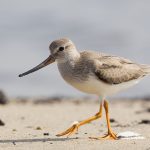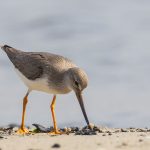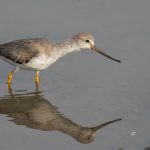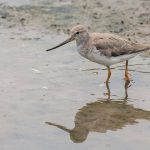August and September marks the start of search for migrant birds in Singapore for most birders. And shorebirds are the first to arrive. During this time, similar looking shorebirds start appearing mainly at our mudflats and our limited shoreline. It is a confusing time for the new birders, as sorting out the various species is not helped by the fact that their plumage and size does not differ much. So here is a short introduction of one of the easier species to pick out, the Terek Sandpiper.
The Terek Sandpiper (Xenus cinereus) is a smaller sized wader that migrates from their breeding ground that stretches from Finland all the way to Siberia. They make a journey of anywhere between 3500km – 4800km to their wintering grounds in Africa, India, the Malaysian Peninsula and Australia. The female starts their journey first in early July and the males and females follow in August. They reach Singapore as early as late July although more commonly seen by September.
The bird itself is rather distinctive. It has short orange legs and a prominent long upcurved bill that is orange at the base. As the scientific specific name implies (cinereus means grey), this wader has a grey back, face and breast in all plumages. Behaviourally, it is a busy looking bird that walks briskly pecking at the surface or probing in shallow water, on soft wet intertidal mudflats and even sandy beaches.
Where can one find the wader and do they appear in large numbers? Normally the Terek Sandpiper will appear at Sungei Buloh, Mandai Mudflats, Seletar Dam. They also appear along Changi Coast, but that location is currently off limits. As they are listed as an uncommon winter visitor, one does not expect a large flock, but perhaps a few birds here and there in any one locality.
This year, one Terek Sandpiper was already reported at Sungei Buloh on 31 August. There will be more to come, as is usually the case.
Photo Gallery
- The Terek Sandpiper, showing its prominently short orange-legs and upcurved bill that is also orange at the base..
- The upcurved bill being used to probe the sand for morsels of food.
- Picking up food from the sandy part of Seletar Dam at low tide.
- Showing the neck being stretched at Sungei Buloh as the tide water rises. The bird is characteristically active and busy looking for food.
- Successfully catching a crustacean at a small pool of water at Hide 2C in Sungei Buloh.
- Another picture of it wading across shallow waters at Hide2C in Sungei Buloh.





